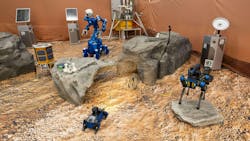ISS robot teaming 'Surface Avatar' test successfully concludes
OBERPFAFFENHOFEN, Germany - Four robots and a live link to the International Space Station ISS made for an unusual scene at the German Aerospace Center's (Deutsches Zentrum für Luft- und Raumfahrt; DLR) 'Earthly Mars' site in Oberpfaffenhofen. On 24 July 2025, the Surface Avatar team carried out the final and most challenging experiment of the campaign to date. NASA astronaut Jonny Kim, aboard the Space Station, took command of the intelligent robot team on the ground, which helped him safely explore the 'Martian landscape' and collect samples. Jonny could deploy the different robots jointly, semi-autonomously, or fully autonomously as required. A new feature that was also tested is the AI chatbot assistant 'Neal AI', which provided real-time support for the astronaut's questions, the German Aerospace Center (DLR) reports. Continue reading original article.
The Military & Aerospace Electronics take:
1 August 2025 - "Surface Avatar is a milestone in human-robot collaboration in space. We have now achieved all the technical requirements for controlling complex robotic missions on Mars – and for a future permanent lunar research station," explains Alin Albu-Schäffer, Director of the DLR Institute of Robotics and Mechatronics.
"By involving an astronaut in microgravity and using relay satellites, we have overcome the technical hurdles involved in the remote control of robots," says Thomas Krüger, Team Lead of ESA's Human-Robot Interaction Lab. "We are therefore confident that we can manage future scenarios – from the Lunar Gateway and Moon habitats to Earth-robot operations. With these experiments and technologies we have built up unique expertise in Europe, with spin-offs for applications on Earth."
Related: NASA seeks commercial partner for ISS robots
Jamie Whitney, Senior Editor
Military + Aerospace Electronics
